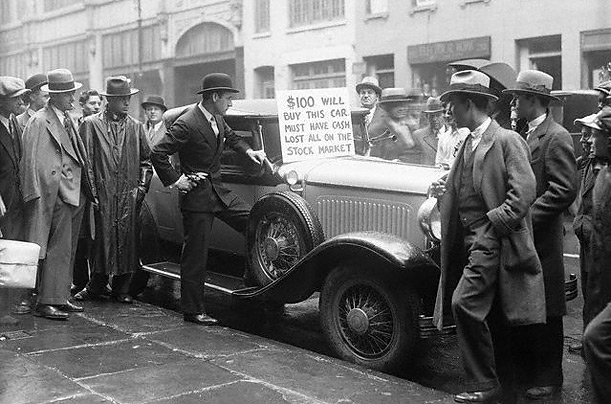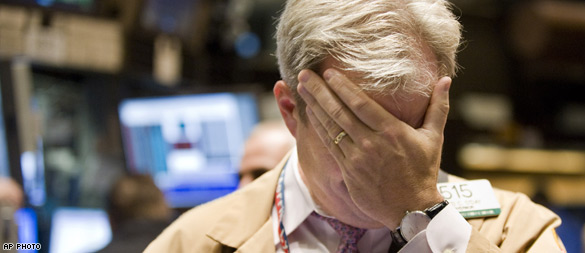“‘Taxpayers are subsidizing a legislative agenda that is inimical to their interests and offensive to what the whole TARP program is about,; said William Patterson, executive director of CtW Investment Group, an activist group affiliated with a coalition of labor unions. ‘It’s business as usual with taxpayers picking up the bill.” Sigh. The WP’s Dan Eggen reports on GM and a host of financial firms using bailout money to lobby for the status quo. “Major recipients of federal bailout money spent more than $10 million to lobby lawmakers in the first three months of 2009, including arguing against pay limits for corporate executives, according to newly filed disclosure records.“
Tag: Banksters
Obama’s Progressive Solution.
“Officials said the proposal would seek a broad new role for the Federal Reserve to oversee large companies, including major hedge funds, whose problems could pose risks to the entire financial system.” With the AIG bonuses setting the table, the Obama administration prepares to unveil an overhaul of the nation’s financial regulatory apparatus. “It will propose that many kinds of derivatives and other exotic financial instruments that contributed to the crisis be traded on exchanges or through clearinghouses so they are more transparent and can be more tightly regulated. And to protect consumers, it will call for federal standards for mortgage lenders beyond what the Federal Reserve adopted last year, as well as more aggressive enforcement of the mortgage rules.”
Whatever malarkey you hear from the GOP about “creeping socialism” over the next few weeks, keep in mind that no less a Republican than Teddy Roosevelt deemed this sort of solution — accountability, transparency, tighter oversight of the financial sector by the federal government — the “New Nationalism” a century ago. In this arena, at least so far, President Obama seems to be living up to his Progressive promise.
Update: “‘Our system failed in basic fundamental ways,’ Geithner told the committee. ‘Compensation practices rewarded short-term profits over long-term returns. Pervasive failures in consumer protection left many Americans with obligations they did not understand and could not sustain. The huge apparent returns to financial activity attracted fraud on a dramatic scale..,To address this will require comprehensive reform. Not modest repairs at the margin, but new rules of the game. And the new rules must be simpler and more effectively enforced.‘” Secretary of the Treasury Tim Geithner unveils the new regulatory package. [Highlights.] “He said financial products and institutions should be regulated according to their economic function and the risks they pose, not their legal form. ‘We can’t allow institutions to cherry-pick among competing regulators and shift risk to where it faces the lowest standards and weakest constraints,’ he told the committee.”
Paging the Populists…and Howard Beale.

I must confess, I find the very-recent press fascination with its latest toy, “populism,” to be more than a little irritating. This is partly because, as with the “socialism!” craze of a few weeks ago, the discussion — above articles excluded — rarely goes any more than an inch deep, and is clearly fueled more by whatever dodgy sound-bites emanated from the Limbaugh-types that morning than any sort of grounded historical thinking. It’s also because, to my mind, the endless tirade of ignorant, self-satisfied, surface-skimming blather vomited forth by the establishment media these days is as much a cause for a populist uprising as the rapacious greed of the asshats at AIG.
From the manifestly idiotic and off-topic lines of questioning of the White House press corps last night, to partisan hacks like AP’s Ron Fournier carrying water for the broken GOP by pushing dumb memes about teleprompters (see also Rick Santelli a few weeks ago), and from self-important blowhards like Howard Fineman conjuring up nonsense out of thin air about the purported dissatisfaction of his chummy club to the host of distractions and non-issues we are endlessly barraged with these days, the mainstream press is worse than failing us — it’s part of the problem.
This is nothing new, of course. From l’affaire Lewinsky to Judy Miller’s WMD to any number of other issues, the establishment media has been at best lazy, simpering, ratings-driven schlock and at worst dangerously ennabling of corrupt GOP behavior over the years. It’s aggravating at the best of times. But we really can’t afford this idiotic water-carrying for Republcans or the smug sense of entitlement that exudes from every pore of the establishment-media overclass, at the moment, as we try to extricate ourselves from the gimongous economic hole dug over the past eight years.
So, Lou Dobbs and your like, next time you endlessly prattle on about how angry the people are getting at Wall Street and/or Obama right now, just remember: Be careful what you wish for. If push comes to shove, there’s a good bet you’ll end up on the wrong end of the pitchfork as well. (AL link via Liam.)
Risky Business.
“What’s interesting about the Madoff scandal, in retrospect, is how little interest anyone inside the financial system had in exposing it…OUR financial catastrophe, like Bernard Madoff’s pyramid scheme, required all sorts of important, plugged-in people to sacrifice our collective long-term interests for short-term gain. The pressure to do this in today’s financial markets is immense. Obviously the greater the market pressure to excel in the short term, the greater the need for pressure from outside the market to consider the longer term. But that’s the problem: there is no longer any serious pressure from outside the market.“
In an extended NYT editorial, authors Michael Lewis and David Einhorn survey recent economic developments with an eye to the broader problem: a financial institutional culture that fosters and legitimates idiotic amounts of risk. “The fixable problem isn’t the greed of the few but the misaligned interests of the many…The tyranny of the short term has extended itself with frightening ease into the entities that were meant to, one way or another, discipline Wall Street, and force it to consider its enlightened self-interest.“
Among the culprits in Lewis and Einhorn’s worthwhile dissection: the credit rating agencies. “In pursuit of their own short-term earnings, they did exactly the opposite of what they were meant to do: rather than expose financial risk they systematically disguised it. ” See also: the S.E.C. “Created to protect investors from financial predators, the commission has somehow evolved into a mechanism for protecting financial predators with political clout from investors…And here’s the most incredible thing of all: 18 months into the most spectacular man-made financial calamity in modern experience, nothing has been done to change that, or any of the other bad incentives that led us here in the first place.“
It’s not all doom, gloom, and (highly justified) finger-pointing. In part two of the editorial, Lewis and Einhorn offer some quick fixes to our current institutional myopia that should be relatively simple to put through…in a perfect world. “The funny thing is, there’s nothing all that radical about most of these changes. A disinterested person would probably wonder why many of them had not been made long ago. A committee of people whose financial interests are somehow bound up with Wall Street is a different matter.“
Blue Monday.

“‘The fact is people are scared and the only thing they’re doing is selling,’ said Ryan Detrick, senior technical strategist at Schaeffer’s Investment Research. ‘Investors are cleaning out portfolios and getting rid of everything because nothing seems to be working.‘” And on the first Monday of that October, the Dow plunged 800 points…I know I spend more time than most contemplating the 1920’s, but I can’t be the only person out there for whom this is all starting to sound eerily familiar…
Update: Hold those dismal historical analogies just yet: Thankfully for everyone, the rally monkey roared at the end of the day, bringing today’s losses to only 370 or so. Still, it’s safe to say things are looking a tad, er, erratic on Wall Street at the moment.
Bailout, or we all sink.

As I said here, I’m not all that happy about the nation having to subsume the risk, and ride to the rescue of, the many banks and Wall Street types that profited massively from these obviously suspect mortgage deals. But, what else is there to do? As with so much else occurring over the past eight years, it befalls us now to clean up the mess left by the free market fundies of late. I just hope we learn something from the economic consequences of this latest binge of free-market fraudulence, before they grow too dire. To wit, whatever the corporate-funded right tells you about self-regulating markets, we need, and will continue to need, real refs on the field.
Update: Uh oh. The bailout compromise dies in the House, prompting the Dow Jones to swiftly tank 700 points. “The measure needs 218 votes for passage. Democrats voted 141 to 94 in favor of the plan, while Republicans voted 65 to 133 against. That left the measure with 206 votes for and 227 against.“
As the TIME article linked above noted before the vote, “the candidate with the most riding on Monday’s vote is McCain, who backed the concerns of conservatives in the House over the initial agreement…[I]f a majority of the House Republicans don’t vote for the measure, McCain could lose political face. ‘If McCain cannot persuade them, it is hard to portray him as a leader,’ said Clyde Wilcox, a political science professor at Georgetown University.” So, that’s the silver lining, I guess. But the bad news now, alas, is considerably worse.
We are all “Socialists” now.
“Let’s be clear about why we’re facing a crisis that could pull down the global financial system. The irresponsibility of individuals who bought houses they couldn’t quite afford pales in comparison with the irresponsibility of the financial wizards who built on those shaky mortgages a towering edifice of irrational faith. Someone in the government should have looked at all those trillions of dollars’ worth of mortgage-backed securities and collateralized debt obligations and credit default swaps and demanded that Wall Street prove that all, or even most, of this purported money was real. But we’re in the eighth year of the Bush administration; adult supervision left the building long ago.” — Eugene Robinson.
Boy, nothing like panic and near-catastrophe in the banking and financial sectors to turn all the stark raving free-market fundies redder than Eugene Debs on May Day, eh? In any event, once again we’re on the verge of learning the hard way that Wall Street does a really lousy job of regulating itself, and that, when push comes to shove, it’s the “don’t-tread-on-me” entrepreneurial capitalists among us who are the first to beg for Big Guvmint to come in and bail them out — at above-market prices. “The only emergency is on Wall Street, and that is entirely of Wall Street’s making. It was the banks that made the loans, the banks that bought the paper, the banks that dumbly believed the models that said that housing prices wouldn’t collapse…How touching to see executives from the likes of Lehman Brothers, not normally an institution associated with widows and orphans, squawk about cutthroat tactics.” And I don’t seem to remember the economic Big Boys, or their mostly-GOP minions in Congress, show such concern about the vagaries of risk when the plight of ordinary folks was being discussed, vis a vis the egregious bankruptcy bill of 2005.
Of course, we can’t just let many of our major financial institutions implode without consequence, and — even though delegating the Dubya administration any more “emergency powers” at this point seems like a colossally bad idea — it seems a given that something will have to be done to sort out all this out, and it will no doubt end up costing taxpayers and aggrieved homeowners a bundle. I just hope, when the dust settles, we remember this time how this all came about, and not just let the idiotic free-market fundies blather on about tax-and-spend liberals killing the entrepreneurial spirit every time some sort of regulatory apparatus is discussed in Washington. We know how that movie ends.
Shattered Glass.
“The Glass-Steagall Act is the Depression-era law that separated commercial and investment banking. It was functionally repealed in 1998, when Travelers (the parent company of Salomon Smith Barney) acquired Citicorp. And it was officially repealed in 1999. But recent events on Wall Street — the failure or sale of three of the five largest independent investment banks — have effectively turned back the clock to the 1920s, when investment banks and commercial banks cohabited under the same corporate umbrella.” As Wall Street takes a dive in the wake of several bank failures and near-failures — but, don’t worry, the fundamentals of the economy are strong and everything — Newsweek‘s Daniel Gross briefly discusses the end of the Glass-Steagal era, and what it means for the American economy.
Straw Man Economics.
“So you’ve managed to create AAA and BBB securities out of a pile of stinky, risky mortgage loans. Boss, you are a genius.” By way of Web Goddess, the Subprime mortgage fiasco, explained with profane stick figures.
The Next to Fall?
The plot thickens…just when the stock market really doesn’t need any more bad news, turns out Citigroup helped Enron evade the law to clear $125 million in debt. Shameful…struggle to get by, and Citibank screws you with exorbitant credit interest rates. Live on the high hog, and they cut you an (illegal) sweetheart deal. Update: J.P. Morgan is in the mix too.

